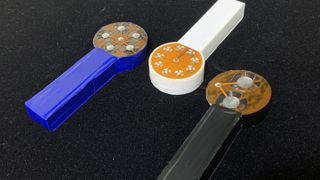Weird lickable lollipop invention lets you taste in virtual reality
Licking a lollipop-shaped device can let you taste and smell nine flavors in VR.

Virtual reality (VR) experiences could soon get a lot more realistic thanks to a lickable device that lets you "taste" in virtual environments.
The small, lollipop-like interface simulates up to nine flavors and can even be combined with smells to make the sensation of taste feel lifelike, scientists said in a new study published Nov. 25 in the journal PNAS.
"In reality, there are five human typical sensations, including vision, audio, haptics [touch], olfaction [smell], and taste," first author Yiming Liu, a researcher in biomedical engineering at City University of Hong Kong and the University of Tokyo, told Live Science in an email. "To develop an immersive VR experience for users, we hope to display all the five sensations to users, where we will establish a flawless 3D virtual world (similar to OASIS in the movie "Ready Player One")."
The lickable device contains small pouches filled with gels. These gels contain chemicals that, when mixed with saliva, simulate different flavors. So far, these flavors include salt, sugar, cherry, citric acid, green tea, passion fruit, grapefruit, durian and milk.
Each flavor is released only when a small electric current passes through each respective gel, and the quantity delivered depends on the voltage applied. This means several flavors can be mixed to create new taste sensations.
Related: Future VR headsets could use a new type of lens inspired by holographic tech
Aside from making VR gaming more immersive, the device could have practical applications, including taste tests by doctors, online grocery shopping and education, the team suggested.
Sign up for the Live Science daily newsletter now
Get the world’s most fascinating discoveries delivered straight to your inbox.
This is not the first time researchers have tried to bring taste to virtual reality. Others have explored directly applying flavor chemicals to the tongue and stimulation using heat and electricity.
This latest development offers a precise, low-energy option with a compact, handheld design. However, Liu noted that the technology is still in its infancy and has limitations. For example, the gels currently last for only about an hour's worth of licking. The team plans to extend this life span and expand the number of flavors available.

Pandora is the trending news editor at Live Science. She is also a science presenter and previously worked as Senior Science and Health Reporter at Newsweek. Pandora holds a Biological Sciences degree from the University of Oxford, where she specialised in biochemistry and molecular biology.